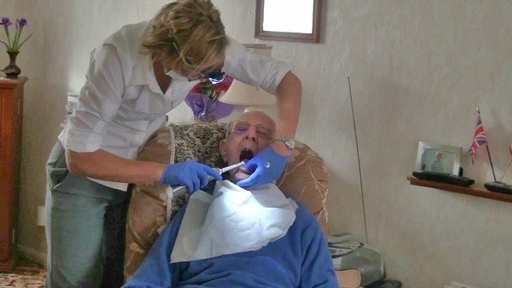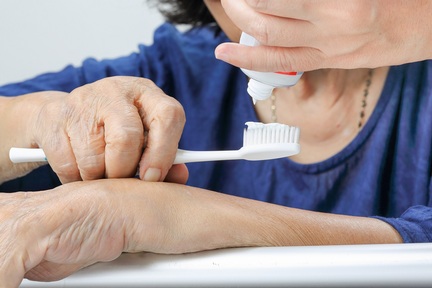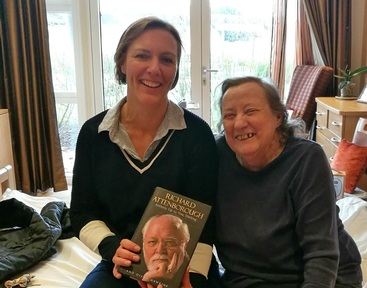Poor oral health can cause 'life threatening conditions,' reveals care home dental hygienist
Dental hygienist, Jane Peterson, is making a difference to the lives of residents in cares homes across the UK, helping them to achieve a “real sense of wellbeing” from the feeling that a fresh mouth gives them.
By her own admission, Jane loves her job, and "residents look forward" to her visits whilst "staff feel supported in mouth matters" for things such as brushing teeth, cleaning dentures and looking out for symptoms of dental deterioration, but she also warns care staff of the "potentially life-threatening conditions that poor oral health can pose on the elderly".

Making sure that people living in care homes have access to proper dental care is absolutely vital according to Ms Peterson, and as she explains, prevention is better than cure.
“Care home residents are encouraged to remain independent for as long as possible but as older people struggle to brush their teeth, they become reliant on care staff,” she says.
“Restoring and extracting teeth on frail, elderly people is certainly not ideal and it makes sense that plaque control and education should be primary.”
Care staff found oral care procedures 'unpleasant'
Being a dental hygienist and trainer certainly keeps Ms Peterson busy. She explains: “I work one day a week in practice but most of my time is spent in care homes providing an oral care service and training.”
Her journey as a dental hygienist began in 1995 and ended up with the formation of her own company, Oral Health Matters Ltd in 2017.
The company came into being after Ms Peterson was gathering information for a study to discover more about carers’ knowledge on dental hygiene and to find out what their perceptions of the mouth were.
Her discoveries were "startling". She said: “Most of care staff I interviewed admitted that they find oral care procedures unpleasant and no one had received training in oral care.
“A few staff were aware of the link between poor oral health and its effects on the body but no one was aware of the potentially life-threatening condition that poor oral health can pose on the elderly, particularly aspiration pneumonia, which is when bacteria from the mouth get inhaled to cause an infection in the lungs.”
‘Residents most likely to reject oral care are people with dementia’
It wasn’t long before other hygienists started contacting Ms Peterson about training to work in care homes.

“I had a lot of interest with regards to care homes wanting training. To meet the demand, I formed a partnership with a dental hygiene therapist and established the company.”
Her timing was good, fitting in with new government guidelines being brought in.
There is currently no mandatory oral care training requirement for care homes, which has led carers to be unsure of how to manage simple oral conditions, yet NICE Quality Standards were introduced in June 2017, something which has been instrumental for Ms Peterson setting up her business.
There are three quality statements that are set out, which are:
• Adults who move into a care home have their mouth care needs assessed on admission
• Adults living in care homes have their mouth care needs recorded in their personal care plan
• Adults living in care homes are supported to clean their teeth twice a day and to carry out daily care for their dentures
Ms Peterson’s service provides a dedicated response to these guidelines, and she strongly believes that “care homes that have incorporated an oral care service feel supported and more confident in delivering oral care, especially to those residents with more complex needs.”
There are three integral parts of oral care that Oral Health Matters provides to care homes.
Firstly, it provides an oral health talk to the care staff to highlight keys points. For example, poor oral health can influence an older person’s mood, dietary intake and general health.
In addition to this, it then offers oral screening, which is essentially a report forwarded to care managers noting residents’ plaque levels, inflammation and any soft tissue manifestations.
A monthly oral care service is then offered, usually with the aim of removing plaque and debris from the oral cavity.
However, the job does pose some real day-to-day challenges, especially when residents reject oral care. Ms Peterson explains: “The residents that are most likely to resist or reject oral care are people with dementia; this more challenging group is expected to rise significantly in the future.
“In the training, we discuss coping strategies for residents that resist oral care.”
‘Care homes are enriched with historical stories waiting to be told’
One of the aspects of visiting homes as a dental hygienist that Ms Peterson particularly enjoys is the relationships that she builds with residents. She says: “Care homes are enriched with historical stories waiting to be told by those living in them.

"I find it fascinating listening to people’s life histories, what shaped the person they are, what trials and tribulations they came across in life.”
Often when visiting a resident, Ms Peterson will make a passing comment on a photo or piece of memorabilia on display, as she finds it gives information about the person, as well as being a way to bond with the resident.
Ms Peterson remembers how she had just finished an oral care visit and noticed a book her father had read about the director Richard Attenborough.
As was her customary way, she mentioned that it was "supposed to be good", to which the resident replied, “I know, I wrote it”. The writer of the book, entitled, ‘Entirely up to you darling’ was a lady called Diana Hawkins who had a glittering career in the film industry. As a fascinating woman to talk to, they have since become good friends.
It is this social side of the business that Ms Peterson finds very rewarding. She goes out of her way to put residents at ease as she is all too aware that many older people can find it "daunting" having a hygienist routing around in their mouths.
Luckily, she has a few tricks up her sleeve when it comes to making her patients feel less nervous about having their teeth cleaned.
She says: “I sit or bend down to their level and make comments about how nice it must be to be surrounded by company, to have people cook and clean for them.
“Quite often if a resident is new, they will be upset about moving into a care home and losing their independence.
"I like to put a positive light on things and make them think about the advantages about not feeling isolated at home on their own.
"I quite often get comments like, ‘Oh I didn’t think of it like that!'.”
For anyone wishing to contact Jane Peterson, her website is www.oralhm.co.uk
Latest Features News
 25-Nov-19
2019 Election: Boris Johnson leaves social care in 'too difficult box' but Labour vows to end 'crisis'
25-Nov-19
2019 Election: Boris Johnson leaves social care in 'too difficult box' but Labour vows to end 'crisis'
 18-Oct-19
Podcast: Wendy Mitchell and dementia: 'My biggest fear is not knowing who my daughters are'
18-Oct-19
Podcast: Wendy Mitchell and dementia: 'My biggest fear is not knowing who my daughters are'
 27-Sep-19
Exclusive: Care minister backs care workers' call for time off to grieve and attend funerals
27-Sep-19
Exclusive: Care minister backs care workers' call for time off to grieve and attend funerals
 19-Sep-19
Podcast: Gyles Brandreth says poetry helps ward off dementia
19-Sep-19
Podcast: Gyles Brandreth says poetry helps ward off dementia
 30-Aug-19
Edinburgh Fringe funnyman joins comics facing toughest audience at care home gig
30-Aug-19
Edinburgh Fringe funnyman joins comics facing toughest audience at care home gig